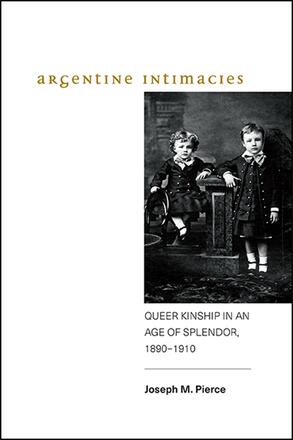
Argentine Intimacies
Queer Kinship in an Age of Splendor, 1890−1910
Alternative formats available from:
Revisits a foundational moment in Argentine history to demonstrate how the crisis of modernity opened up new possibilities for imagining kinship otherwise.
Description
Winner of the 2020 Best Book in the Nineteenth Century Award presented by the Nineteenth Century Section of the Latin American Studies Association
As Argentina rose to political and economic prominence at the turn of the twentieth century, debates about the family, as an ideological structure and set of lived relationships, took center stage in efforts to shape the modern nation. In Argentine Intimacies, Joseph M. Pierce draws on queer studies, Latin American studies, and literary and cultural studies to consider the significance of one family in particular during this period of intense social change: Carlos, Julia, Delfina, and Alejandro Bunge. One of Argentina's foremost intellectual and elite families, the Bunges have had a profound impact on Argentina's national culture and on Latin American understandings of education, race, gender, and sexual norms. They also left behind a vast archive of fiction, essays, scientific treatises, economic programs, and pedagogical texts, as well as diaries, memoirs, and photography. Argentine Intimacies explores the breadth of their writing to reflect on the intersections of intimacy, desire, and nationalism, and to expand our conception of queer kinship. Approaching kinship as an interface of relational dispositions, Pierce reveals the queerness at the heart of the modern family. Queerness emerges not as an alternative to traditional values so much as a defining feature of the state project of modernization.
Joseph M. Pierce is Associate Professor of Hispanic Languages and Literature at Stony Brook University, State University of New York.
Reviews
"Pierce has written a work that invites us to remember something difficult to achieve in today's academe: the balanced juncture of the pleasure of thinking and of reading. I am referring to the precision of [his] prose, linked to a lucid, creative, and renewed mode of thought … This book-manifesto … of queer Latin American critique is fundamental for scholars in the field aiming to reimagine the process of research by taking identity as a cultural object." — Fernando A. Blanco, Revista Iberoamericana
"The book is an expansive project that provides an insightful and thorough analysis that breaks with heteropatriarchal understandings of family structures in Latin America … Pierce provides a critical interrogation between U.S.-based queer studies and Latin American studies that will allow scholars in the two fields to think in more hemispheric terms." — GLQ: A Journal of Lesbian and Gay Studies
"Argentine Intimacies is a fine contribution to Argentine studies, to fin-de-siècle studies and to queer studies when understood in a far larger sense than solely lesbigay liberation." — Bulletin of Spanish Studies
"Argentine Intimacies provides a valuable intervention in the fields of cultural studies, Latin American studies, LGBT/queer studies, literary studies, and photography studies. Pierce conducted extensive archival research on the historically significant Bunge family in Argentina and offers lucid, theoretically informed, and original readings of their lives and cultural productions." — Lawrence La Fountain-Stokes, University of Michigan